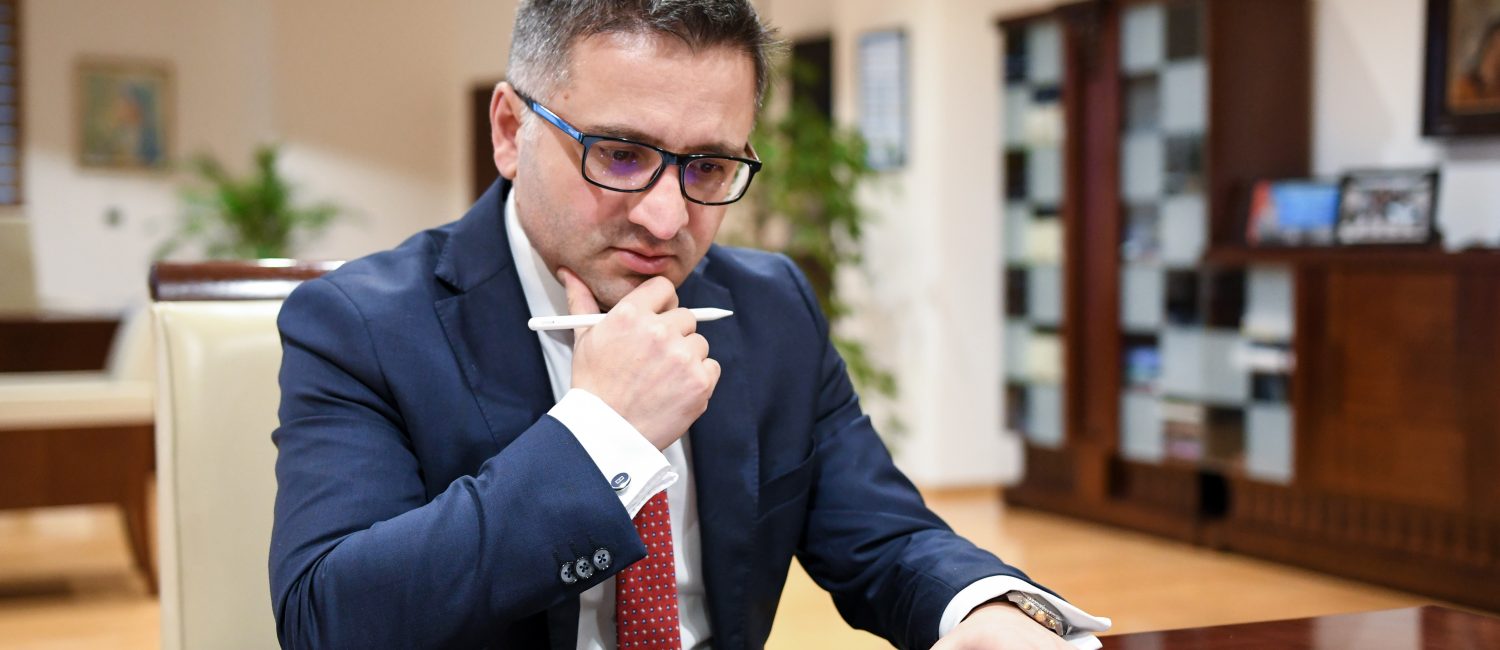2nd September 2023, Skopje – I am delighted with the opportunity to announce, in this column, the Third Annual Conference of the Skopje Economic and Finance Forum (SEFF). SEFF is an initiative of the Ministry of Finance aimed at establishing a platform for public policy debate on topics of relevance for both our country and the region as a whole. It is a result of our commitment, as an institution, to transparency and inclusive dialogue with all societal stakeholders, considering that inclusiveness is essential to reaching sustainable solutions. Bringing policy makers, political representatives, international development partners, civil society, academia, business community and other experts together and encouraging debates are aimed at creating synergy of ideas and initiatives for economic recovery and an inclusive, accelerated and green growth.
At the dawn of better, European tomorrow for our country, with number of new opportunities for higher standard of living, better conditions, safety and perspective for all its citizens, topic at the Conference discussion this year cannot be anything else but the EU. “Europe – YES, Europe – NOW”, i.e. “European Integration and Economic Prosperity”, is the topic of discussions at the Third Annual SEFF Conference, to be held on 15th September. Debates will focus on accelerating the European and the regional integration, enhancing the business environment for underpinning economic prosperity, geopolitics and policies, as well as global trends and opportunities for the economy. High representatives of the European Commission, the European banks – European Investment Bank, Council of Europe Development Bank and European Bank for Reconstruction and Development, international financial institutions, such as the World Bank and the IMF, USAID, representatives of governments in the region, diplomats, business sector, academia, etc., will have their address at the Conference.
Today, when the narrative about the European integration is mainly political one, it is a good thing to re-open the discussion for all aspects – economic, social, geostrategic, so as for all of us as citizens to get the bigger picture. Clearly, we faced many ordeals in the past two decades, unsettling the confidence of part of the public that the European agenda will become a reality one day. But, there is a saying the darkest hour is just before the dawn. For instance, in the case of Croatia, immediately before it joined the Union, the public was ambivalent about the EU integration process. I personally expect that Euroscepticism in our country will speedily decrease in the coming period, but we are to get to that point first. In this column, I will elaborate on my thoughts why one should say “YES” to Europe and why “NOW” is the right moment, as an overture to my discussion at the SEFF Conference.
Why “YES“ for Europe?
European Union, as a political peace project, is built upon the economic union. <0} Since the European Coal and Steel Community until the creation of a single currency monetary union, the countries on the European soil have been always motivated primarily by economic interests. However, all these countries also share common values, the urge for peace, democracy, security and human rights. Altogether, nowadays, the 27 Member States represent a heterogeneous combination of culture, languages and history, united with the aim of providing better living conditions for the citizens thereof.
Economists are inexhaustibly inspired by the European Union in view of their research, analyses and papers, given its transformative power on the society and the economy. The theory of comparative advantages, the achievement of economies of scale, the theories of financial and economic integration, as well as those related to endogenous growth, are applicable in the case of the EU. Single market, fiscal and financial integration, institutional connectivity and harmonization with the EU Acquis, and overall, roughly speaking – symbiosis with the more developed and advanced countries, contribute to growth acceleration and development of the economies becoming part of the Union.
High living standard maximally speaks in favor of the Union’s transformative power. According to the carried out studies and analyzes of long-time series of statistical data, the impact of EU on the economy is estimated at additional 12% -20% of GDP per capita. As per certain studies, the effects of the European Single Market on trade and GDP, are rated at approximately 10% of EU GDP in average. Improved business climate and progress as regards the structural reforms have also been recorded among the new Member States. If briefly summarized, the following benefits stand out:
Trade Integration. The Single Market is an area of free trade without tariff or non-tariff barriers among its members. As I mentioned above, it provides for instigating labor specialization, growth and convergence among the Member States. For instance, trade between old and new grew Member States grew almost threefold in less than 10 years preceding the 2004 and 2007 enlargements and fivefold among the new members themselves. The benefits apply to both the business sector in view of its boosted competitiveness, and the citizens given their access to more available high-quality products and services with less costs. For example, Internet and telephones services across the EU have the same costs, as a result of the abolition of roaming charges. It is also worth to mention the protection of consumers’ rights, being at a high level in the Union.
Scale Economy. Through the Single Market with half a billion consumers, from a microeconomic point of view, it is much easier to achieve an economy of scale, thus entailing lower costs via greater production volume. Moreover, the EU is the largest trade bloc in the world, as well as the world’s largest exporter of manufactured goods and services, and the biggest import market. The EU accounts for around 15% of the world’s trade in goods. Thanks to the joint actions, the common trade strategy, it is highly positioned on the global trade stage, whereby the bilateral trade agreements provide for opening up new opportunities for Unions’ businesses to enter new markets.
Single Currency and Free Movement. As per few studies, the adoption of a single currency, as well as the abolition of internal borders within the Union, is in support of further facilitation of the trade, and thus boosting economic growth and development of the separate economies. Over 340 million EU citizens use the euro, thus protecting them against the risk of currency fluctuation and exchange costs, while also contributing to strengthened Single Market. Free movement applies both to businesses, which are protected against globalization risks through the EU Rules supporting small businesses, and people, who can educate, practice, volunteer and work in the Union.
Financial Integration. European integration also implies financial openness, coupled by greater capital account liberalization. Economic literature also refers to the “spillover” effect of foreign direct investments, resulting from the integration, thus entailing new investments, jobs, transfer of technology and knowledge, up until economic development as a whole. The 2004 enlargement demonstrates that the inflows of foreign direct investments from EU-15 to the new Member States, accounted for 30% of GDP from the new Member States in the next two years (EC 2006).
Solidarity and Common Funds. European Union provides structural and investment funds for the new Member States, as well as development funds for the candidate countries through the Pre-Accession Funds (IPA). These funds play significant role in the regional equal development, development of the infrastructure and boosting of the economic growth.
Institutional integration. Improvements as regards rule of law, political stability, regulatory quality, fight against corruption, accountability, effectiveness in the public sector and services – these are the benefits of transposing European supranational legislation into the national legislation. Progress in the pre-accession period has been particularly evident, with the reform intensive dynamics yielding outstanding results as regards the institutional capacity building.
The other benefits cover integrated approach in resolving some essential issues of global significance, such as environment protection and tackling climate change, coupled by the international diplomacy, where the voice of all the EU Member States has a significantly stronger resonance and prominence internationally than in case they act separately. This also applies to the safety, as well as the human rights, also governed by the supranational legislation.
Over Twenty Times More Resources under EU Funds Per Capita upon EU Membership
As the country approaches the Union, more Funds, both development and structural, are unlocked, available for usage thereby. Members, on the other hand, have at their disposal Funds that are multiply higher than those available to the candidate countries. I will hereby make a comparison between the Cohesion Fund and the EU IPA Pre-Accession Funds.
The Cohesion Fund provides support to EU Member States with a Gross National Income per capita below 90% of the EU -27 average. This Fund aims to support the economically less developed Member States, the ultimate goal of which is economic and social cohesion of the EU. The Cohesion Fund will be used for providing financial contributions in the fields of environment and trans-European networks in the area of transport infrastructure. In the period 2021-2027, the Cohesion Fund concerns Bulgaria, the Czech Republic, Estonia, Greece, Croatia, Cyprus, Latvia, Lithuania, Hungary, Malta, Poland, Portugal, Romania, Slovakia and Slovenia or around 128 million inhabitants of the Union. In the period 2021-2027, EUR 392 million was made available thereto via this Fund, or as per the rough estimates, approximately EUR 3,000 per capita at these countries (with total population of 128 million inhabitants).
During the same period, Pre-Accession Fund – IPA III (2021-2027) is made available to the candidates or the potential candidate countries, amounting to total of EUR 14.2 billion. The purpose of this Fund, based on the principle of solidarity, is to support the candidate countries in implementing the political, institutional, legal, administrative, social and economic reforms, being required so as to get harmonized with the rules, standards, policies and practices of the European Union, all to the end of further ensuring its stability, security and prosperity. As per the approximate estimates, under IPA III, around EUR 140 per capita are provided for the citizens of Albania, Bosnia and Herzegovina, Kosovo, North Macedonia, Montenegro, Serbia and Turkey (with a total population of 103 million inhabitants).
To sum up, the difference between the status as an EU candidate country and a Member State thereof, is EUR 2,868 per capita, i.e. 21.8 times more resources under the Funds (3,006/138=21.8). This means that, as per the approximate calculations, the EU membership will generate additional EUR 2,868 per capita in the country, i.e. additional EUR 5.2 billion in five years, equaling the amount of our 2023 State Budget. These funds will provide for improved infrastructure, better living conditions, more operating assets for our businesses and higher living standard for our workers. I would like to hereby stress that this is only an approximate estimate, whereby the benefits from the EU membership are multiple, covering plenty of areas as mentioned above. Costs are unquestionably incurred, pertaining to the production adaptation and the observance of the stringent environmental standards, which must inevitably be implemented in support of boosted competitiveness and resilience of our economy, striving to integrate into the European and the global value chain.
In one of the past columns dedicated to the EU (I will hereby emphasize once again that, both as a Deputy Prime Minister in charge of European Affairs and as a Minister of Finance, I have been continuously inspired by the EU in view of my analyzes and reviews), I wrote about the EU Budget, which is, in the period 2021-2027, estimated at around EUR 2,000 billion, as funds geared towards providing support for the following areas: Single Market, Innovation and Digital, Cohesion, Resilience and Values; Natural Resources and Environment; Migration and Border Area Management; Neighborhood and the World and the European Public Administration. The mere purpose hereto is for the readers to get broader idea bout all Funds at disposal to the candidates, being much more numerous for the EU Member States.
Why Europe “NOW”?
Upon the outbreak of the war in Ukraine, there is growing focus on the fact that now is the right time for EU enlargement, as well as for the Western Balkans to get close to and access the Union. With European Parliament elections approaching, which are to be held in 2024, it is increasingly likely that further enlargement will be a top priority on the agenda. The statements and those who stand for further integration and EU enlargement are becoming increasingly prevalent.
About a month ago, the President of the European Commission, Ursula Von der Leyen, announced the new plan for getting Western Balkans closer to the European Union, as well as the economic support therefor. This plan may be perceived as a helping hand lent to the Western Balkans. As Ursula von der Leyen herself pointed out, “We do not only ask our partners to take new steps towards us. We also take a big step towards them. Our shared goal is to speed up their journey towards the EU”. It is not necessary to read much between the lines for the clear message Von der Leyen conveyed to both the leaders and the citizens. This is unquestionably a great opportunity which should be taken advantage of, being also an encouraging sign given the specific background in view of divided opinions about joining the EU.
Upon the several overlapping global economic crises, we faced in the past three years, this is good news, and we should undoubtedly make the most thereof. We should begin by seizing the historical moment and take maximum advantage thereof, all to the end of implementing the necessary reforms and, as I often say, bring “Europe home” even before we join the EU. This should be followed by realizing all advantages and challenges, as well as by reaching a rational decision, which would bring benefits to our citizens, in view of enjoying their presence, while willing to build their future in our country rather than outside of it.
I hope I justified the affirmative reply to why “yes” and why “join” the EU right now. The debate is open and I expect fruitful joint discussions, all to the end of making the best decision for us and our children, grandchildren, for a better today and even better tomorrow, for us all, here, as part of Europe, to which we belong.
















